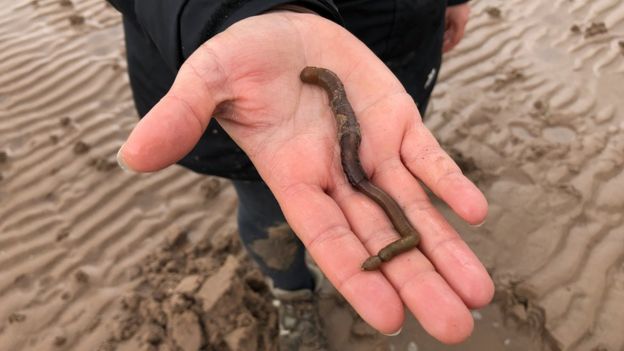
Audio By Carbonatix
Birds living on river banks are ingesting plastic at the rate of hundreds of tiny fragments a day, according to a new study.
Scientists say this is the first clear evidence that plastic pollutants in rivers are finding their way into wildlife and moving up the food chain.
Pieces of plastic 5mm or smaller (microplastics), including polyester, polypropylene and nylon, are known to pollute rivers.
The impacts on wildlife are unclear.
Researchers at Cardiff University looked at plastic pollutants found in a bird known as a dipper, which wades or dives into rivers in search of underwater insects.
"These iconic birds, the dippers, are ingesting hundreds of pieces of plastic every day," said Prof Steve Ormerod of Cardiff University's Water Research Institute. "They're also feeding this material to their chicks."
Previous research has shown that half of the insects in the rivers of south Wales contain microplastic fragments.
"The fact that so many river insects are contaminated makes it inevitable that fish, birds and other predators will pick up these polluted prey - but this is the first time that this type of transfer through food webs has been shown clearly in free-living river animals," said co-researcher Dr Joseph D'Souza.

The research team examined droppings and regurgitated pellets from dippers living near rivers running from the Brecon Beacons down to the Severn Estuary.
They found microplastic fragments in roughly half of 166 samples taken from adults and nestlings, at 14 of 15 sites studied, with the greatest concentrations in urban locations. Most were fibres from textiles or building materials.
Calculations suggest dippers are ingesting around 200 tiny fragments of plastic a day from the insects they consume.
Previous studies have shown that microplastics are present even in the depths of the ocean and are ending up in the bodies of living organisms, from seals to crabs to seabirds.
Rivers are a major route between land and sea for microplastics such as synthetic clothing fibres, tyre dust and other fragmenting plastic waste.
The research, published in the journal Global Change Biology, was carried out in collaboration with the Greenpeace Research Laboratories at the University of Exeter.
Latest Stories
-
Lekzy DeComic gears up for Easter comedy special ‘A Fool in April’
33 minutes -
Iran declares 40 days of national mourning after Ayatollah Ali Khamenei’s death
1 hour -
Family of Maamobi shooting victim makes desperate plea for Presidential intervention
2 hours -
Middle East turmoil threatens to derail Ghana’s single-digit gains
3 hours -
Free-scoring Semenyo takes burden off Haaland
3 hours -
Explainer: Why did the US attack Iran?
4 hours -
Peaky Blinders to The Bride!: 10 of the best films to watch in March
5 hours -
Crude oil price crosses $91 as Strait of Hormuz blockade chokes 22% of global supply
5 hours -
Dr. Hilla Limann Technical University records 17% admission surge; launches region’s first cosmetology laboratory
6 hours -
Over 50 students hospitalised after horror crash ends sports tournament
6 hours -
Accra–Dubai flights cancelled as Middle East tensions deepen
7 hours -
See the areas that will be affected by ECG’s planned maintenance from March 1-5
7 hours -
Kane scores twice as Bayern beat rivals Dortmund
8 hours -
Lamine Yamal hits first hat-trick in Barcelona win
8 hours -
Iran says US and Israel strikes hit school killing 108
8 hours

